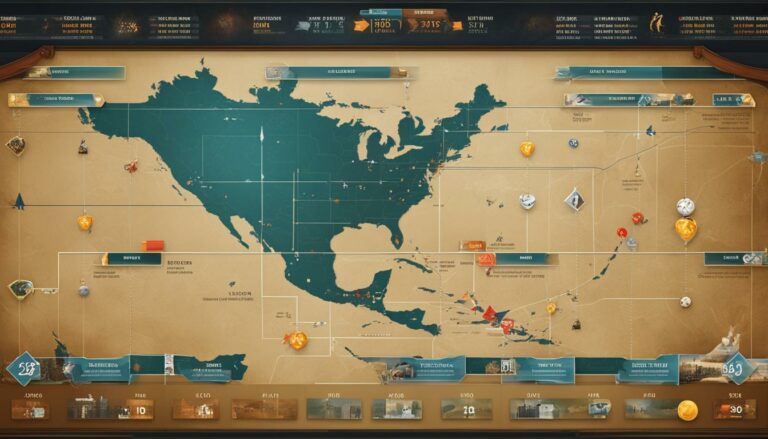Sports betting has been around for centuries, and its origins can be traced back to ancient civilizations where people would place wagers on the outcome of athletic competitions. From chariot races in ancient Greece to gladiatorial contests in Rome, sports betting has always been a popular pastime. However, it wasn’t until the 19th century that sports betting began to take on a more modern form.
In this section, we will explore the fascinating history of sports betting and uncover when it first started. We will take a closer look at the origins of sports betting and examine its evolution over time, providing a comprehensive understanding of this exciting industry.
Key Takeaways
- Sports betting has been around for centuries
- Ancient civilizations placed wagers on athletic competitions
- Sports betting took on a more modern form in the 19th century
- Understanding the history of sports betting provides a comprehensive understanding of the industry
- Sports betting has evolved over time and continues to do so
Early Beginnings: The Roots of Sports Betting
When we talk about the beginnings of sports betting, we must consider the historical context in which it emerged. Informal wagers between individuals, such as who would win in a footrace or boxing match, have been around since ancient times. However, it was not until the 18th century that more structured betting systems began to develop.
During the 1700s, horse racing held a prominent place in British culture, and bookmakers began offering fixed odds betting on races. This led to the creation of betting exchanges, where individuals could place and accept bets from others, marking an early form of sports betting as we know it today.
| Year | Event |
|---|---|
| 1790 | First recorded boxing match bet on by a bookmaker |
| 1867 | Legalization of bookmaking in the UK |
| 1896 | First modern Olympics held in Athens, Greece, sparking a surge in sports betting on the games |
The early origins of sports wagering can also be traced back to ancient civilizations, where betting on various sports competitions was a common pastime. For example, the ancient Greeks bet on events such as the Olympic Games, while the Romans placed wagers on chariot races.
As sports grew in popularity and the demand for betting increased, new forms of sports betting emerged, including point spread betting and parlay betting. These developments marked the beginning of a new era in sports betting, paving the way for the modern industry we know today.
“Sports betting has been a part of human culture for thousands of years, and it continues to evolve with each passing century.”
As we can see, the historical development of sports betting is a multifaceted and fascinating topic. By exploring its roots, we gain a deeper understanding of how this thrilling industry came to be.
The Rise of Modern Sports Betting
The evolution of sports betting from its early beginnings to the current industry is a fascinating journey that provides insight into its historical development. Early sports betting was often informal wagers between individuals, but it has since evolved into a structured system with many different options for gamblers. The historical development of sports betting was driven by advancements in technology, changes in laws and regulations, and the ever-growing demand from sports fans.
The Early Days of Online Sports Betting
One of the most significant milestones in the evolution of sports betting was the introduction of online betting platforms. The first online sportsbook was created in the mid-1990s and quickly gained popularity among sports enthusiasts. The convenience of being able to place bets from the comfort of their homes revolutionized the industry and paved the way for even greater growth.
As the popularity of online sports betting grew, so did the number of platforms available to the public. The early days of online sports betting were characterized by a lack of regulation, which made it possible for many unscrupulous operators to take advantage of unsuspecting gamblers. However, as governments began to recognize the potential of sports betting revenue, they started to enact laws and regulations to protect consumers and ensure a fair playing field.
Legalization of Sports Gambling
The legalization of sports gambling in different jurisdictions has been one of the most significant drivers of its evolution into a mainstream industry. The landmark Supreme Court decision in May 2018 that declared the federal ban on sports betting unconstitutional paved the way for individual states to legalize the practice. As of 2021, more than two dozen states have legalized sports betting, and the number is expected to continue growing in the coming years.
The Future of Sports Betting
The evolution of sports betting will continue to be shaped by technological advancements, changes in laws and regulations, and the growing demand from sports fans. The industry is expected to keep growing in the coming years, with more states legalizing sports betting and more platforms entering the market. As the industry continues to evolve, it will be interesting to see how sports betting will continue to impact the world of sports and the fans that love them.
Shaping the Sports Betting Landscape: Key Influences and Events
Throughout history, several key events and influences have shaped the sports betting landscape, leading to the modern-day industry we know today. These events have influenced the development and evolution of sports betting, including its regulations, technology, and cultural acceptance. Let’s take a closer look at some of these pivotal moments in the history of sports betting.
The Origins of Regulation
The regulation of sports betting has been a significant influence on its evolution. In the United States, the history of sports betting regulations can be traced back to the early 1900s when several states began to ban bookmaking. However, it was not until the 1960s that Nevada legalized sports betting, becoming the only state in the US where it was legal for many years. The Professional and Amateur Sports Protection Act (PASPA) of 1992 further prohibited sports betting across most of the US, with only four states exempted. However, in 2018, the Supreme Court struck down PASPA, paving the way for individual states to legalize sports betting.
The Emergence of Online Betting
The advent of the internet revolutionized the sports betting industry with the introduction of online sportsbooks. In 1996, Intertops became the first online sportsbook, providing a new, convenient way for people to place bets. The introduction of online sports betting platforms has since transformed the industry, making it easier and more accessible for people to participate in sports gambling.
The Impact of Technology
Technological advancements have also been a crucial influence in the evolution of sports betting. Automated odds-setting technologies have improved the efficiency of sportsbooks, while live streaming has revolutionized in-play betting. Mobile technology has also played a significant role, allowing people to place bets from anywhere, at any time. As technology continues to advance, it is likely we will see further changes in the sports betting industry.
The Future of Sports Betting
The ongoing evolution of sports betting is an exciting prospect, with new technology and regulations continuing to shape the industry. As more states in the US legalize sports betting and the global market continues to expand, the future of sports betting looks bright. According to a report by Zion Market Research, the global sports betting market is expected to reach $155.4 billion by 2024, demonstrating the continued growth and significance of this industry.

“Sports betting is a global phenomenon that has transformed significantly throughout history. From regulations to technology, the many key influences that have shaped the industry continue to impact its ongoing evolution. As sports betting becomes more widely accepted and accessible, we can expect to see even more changes in the years to come.”
Conclusion
The history of sports betting is a fascinating journey that has evolved over time. From its early beginnings, sports betting has gone through various stages of development to become the billion-dollar industry it is today. By exploring its timeline, we have gained a deeper understanding of the origins and ongoing evolution of this thrilling form of entertainment.
We have seen how sports betting has undergone significant changes, from informal wagers between individuals to more structured betting systems and the introduction of online platforms. We have also witnessed the impact of regulations and landmark court cases that have affected the sports betting landscape.
Despite the challenges that the industry has faced throughout its history, it continues to thrive, attracting millions of fans globally. As we move forward, we can expect to see further developments such as new technologies, innovative products, and more legal jurisdictions that will continue to shape the sports betting landscape.
The Future of Sports Betting
The future of sports betting is exciting, and we can expect to see the industry continue to grow and evolve. With the advancements in technology, we can expect to see more innovative products that will enhance the betting experience for fans. Furthermore, with more legal jurisdictions opening up, more people will be able to enjoy the thrill of sports betting in a safe and regulated environment.
In conclusion, the evolution of sports betting has been a remarkable journey, and the coming years promise to be even more exciting. Whether you are a seasoned bettor or a newcomer to the sports betting world, the future looks bright, and we can all look forward to being part of this thrilling industry.
FAQ
When did sports betting start?
Sports betting has been around for centuries, with its origins dating back to ancient civilizations. The earliest recorded instances of sports betting can be traced back to the Greeks in the 8th century BC, who placed wagers on events like the Olympic Games.
What is the history of sports betting?
The history of sports betting is a fascinating one, filled with twists and turns. Over the years, it has evolved from informal wagers between individuals to a highly regulated industry. The timeline of its development includes significant milestones such as the introduction of bookmaking in the 19th century and the rise of online betting platforms in the 21st century.
What are the origins of sports betting?
The origins of sports betting can be traced back to ancient civilizations, where individuals would place bets on the outcome of sporting events. From the Greeks and Romans to the Chinese and Persians, sports betting has been a popular pastime throughout history.
How has sports betting evolved over time?
Sports betting has come a long way from its early beginnings. It has evolved from informal wagers to more structured betting systems, and from local bookmakers to global online platforms. The introduction of new technologies and the legalization of sports gambling in various jurisdictions have also played a significant role in its evolution.
What are the key influences and events that have shaped the sports betting landscape?
The sports betting landscape has been shaped by a variety of influences and events. Landmark court cases, regulations, and technological advancements have all had a significant impact on how sports betting operates today. These factors have helped shape the industry and continue to influence its ongoing development.


